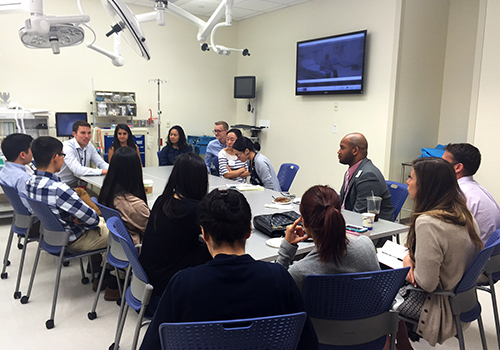A great deal of what determines our health—40 percent in fact—is due not to clinical health care but to what are known as social determinants of health (SDOH) or health-related social needs (HRSN).

What is SDOH or HRSN?
Social determinants of health (SDOH) or health-related social needs (HRSN) are things like housing and food, and a lack of access to them has a big impact on people’s health. However, traditionally our health care system has not focused on addressing these needs.
What is HCFA doing to address this problem?
HCFA is working with partners to conduct research, learn more about the best ways to address SDOH and HRSNs, and advocate with policymakers to increase and improve efforts to help people stay healthy by making sure they have access to food, housing, and other needs.

- HCFA is conducting research to assess the implementation of a new MassHealth program for health care organizations known as accountable care organizations (ACOs) that must screen for HRSNs and partner with community-based organizations (CBOs) to provide supports for those in need of housing and food needs. Initially, there was little understanding of how this program would work and little sharing of information between organizations. In partnership with the Massachusetts Public Health Association (MPHA), and the Alliance for Community Health Integration (ACHI) HCFA is interviewing organizational staff annually for three years to develop findings, summarize best practices, and make policy recommendations for how MassHealth can improve the program in the short and long term.
- HCFA is collaborating with housing organizations to highlight the impact of housing insecurity on health and supporting investment and other supports to ensure access to affordable housing. The COVID-19 pandemic has made the connection between housing and health clearer than ever. And HCFA is focusing advocacy on supports that help people stay housed and avoid eviction in addition to ensuring protections for those currently experiencing homelessness. In addition, HCFA is also working to identify solutions to the lack of affordable housing in Massachusetts that put many at risk of housing insecurity.
- HCFA is working with a coalition of organizations to address issues of food insecurity, with a particular focus on ensuring those eligible for federal food support through the Supplemental Nutrition Assistance Program (SNAP). There is a concerted effort to close what is known as the “SNAP Gap”–individuals who are enrolled in MassHealth and eligible for nutrition benefits, but who are not enrolled in the SNAP program. Helping individuals get access to these nutrition benefits could help hundreds of thousands of Massachusetts residents by leveraging federal, rather than state funds that are already available, but unused.
What has been accomplished already to address this problem?
HCFA and MPHA have conducted interviews with ACOs and CBOs and shared learnings and best practices from the analysis back to these organizations including presenting the research and recommendations at multiple learning symposiums for stakeholders. In addition, HCFA has also shared findings and recommendations with MassHealth on multiple occasions, and several recommendations have been taken into consideration through program modifications. This has included the establishment of multiple opportunities for ACOs and CBOs to propose partnerships.
HCFA has submitted testimony, spoken with legislators, signed letters, and co-authored court amicus briefs in support of maintaining protections against evictions and investing in rental assistance. An eviction moratorium was enacted and has been in place since April of 2020, and the Legislature and Administration have significantly increased funding for rental assistance.
HCFA has spoken out in support of dedicated funding to establish a common application for nutrition supports and MassHealth to increase efficiency and help close the “SNAP Gap.” The Legislature specifically dedicated funding for this purpose to help more Massachusetts residents get the nutrition supports they need and are eligible for.

Where can I find more information about this campaign?

How can I get involved in this work?
Contact Health Care For All’s Co-Director of Policy and Government Relations, Alex Sheff.
Be a Health
Care Defender
Support the work of Health Care For All by making a donation today. Your investment enables Health Care For All to help families get the health coverage they need so they can lead healthy lives.
